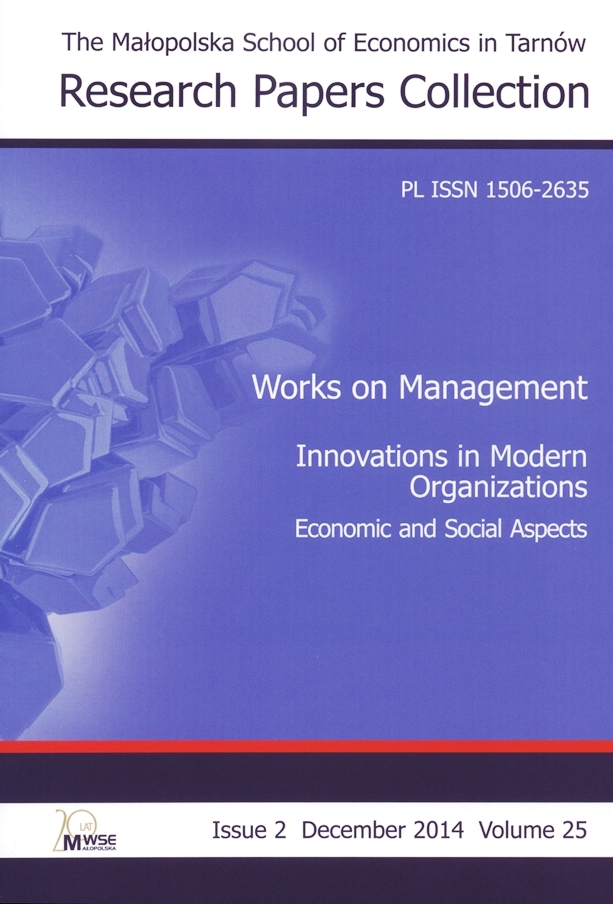Abstract
Cooperation of companies determines the development of the modern economy and creating innovation. Experts even recognize its superiority over the competition. The degree of cooperation is dependent on the environment, competitors, and the needs of the cooperator. Any company that operates in terms of the knowledge economy to be developed and strengthened its position in the market must be innovative, and this is possible due to acquisition of knowledge external sources. Derivative of cooperation based on mutual learning process is created in the system value innovation. The practice indicates a growing number of cooperation initiatives by external actors with small and medium-sized enterprises, in spite of the fact their cooperation is exposed to the impact of the many barriers that arise both from market conditions and internal determinants dependent on the entity. In the first part of the article we outline theoretical aspect of cooperation. The second part of the article is devoted to the presentation of research results that show the conditions of cooperation of small and medium-sized enterprises in Tarnów and Małopolska Region. The purpose of this article is to present modern forms of knowledge from the outside. The paper attempts to identify the determinants and assess the level of cooperation of small and medium-sized enterprises, as a prerequisite for strengthening their capacity development.
References
Bal-Woźniak, T. (2007). Innowacyjność fundamentalnym warunkiem przedsiębiorczości powszechnie opartej na wiedzy. Porównania międzynarodowe. In: M. G. Woźniak (ed.). Nierówności społeczne a wzrost gospodarczy. Gospodarka oparta na wiedzy (p. 99–113). Rzeszów: Uniwersytet Rzeszowski. ISBN 978-83-7338-318-0.
View in Google Scholar
Czakon, W. (2011). Paradygmat sieciowy w naukach o zarządzaniu. Przegląd Organizacji, 3, 3–6.
View in Google Scholar
Danias, K., Kavoura, A. (2013). The role of social media as a tool of a company’s innovative communication activities. The Małopolska School of Economics in Tarnów Research Papers Collection, 23 (2), 75–83.
View in Google Scholar
Danik, L., Żukowska, J. (2011). Czynniki wpływające na sukces kooperacji polskich przedsiębiorstw w innowacjach (w przekroju branżowym). Prace naukowe UE. Problemy regionalizmu i globalizacji, 221, 123‒136.
View in Google Scholar
Gancarczyk, M. (2012). Koncepcja sieci z perspektywy teorii kosztów transakcyjnych. Współczesne Zarządzanie, 3, 61–69.
View in Google Scholar
Kavoura, A. (2013). Branding the identity of the Greek State. Tourism Culture and Communication, 12 (2–3).
View in Google Scholar
Markiewicz, J. (2007). Wpływ instytucji wsparcia na rozwój kooperencji i innowacyjności przedsiębiorstw w województwie zachodniopomorskim [online, accessed: 2014-02-24]. Zeszyty Naukowe Uniwersytetu Szczecińskiego, 453. Ekonomiczne problemy usług, 8. Retrieved from: http://www.wzieu.pl/zn/453/summ/14_markiewicz.pdf.
View in Google Scholar
Matusiak, K. (2010). Budowa powiązań nauki z biznesem w gospodarce opartej na wiedzy. Rola i miejsce uniwersytetu w procesach innowacyjnych. Warszawa: Szkoła Główna Handlowa – Oficyna Wydawnicza. ISBN 978-83-7378-514-4.
View in Google Scholar
Moczała, A. (2005). System wspomagania kooperacji. Bielsko-Biała: Wydawnictwo ATH. ISBN 83-89086-08-5.
View in Google Scholar
© Copyright by Małopolska School of Economics in Tarnów. The articles are available under the Creative Commons Attribution NonCommercial-NoDerivatives 4.0 International License


